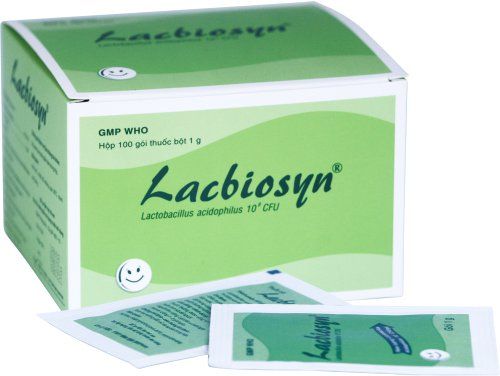This is an automatically translated article.
Diamode is used to treat sudden diarrhea (including traveler's diarrhea). Diamode is used to slow bowel movements. This reduces the number of bowel movements and makes stools less watery. Diamode medicine only works to treat the symptoms of diarrhea, not the cause.1. What is Diamode drug?
Diamode has loperamide as the main ingredient, which slows down bowel movements. This reduces the number of bowel movements and makes the stools less watery. Diamode medicine only works to treat the symptoms of diarrhea, not the cause.Loperamide is also used to reduce the amount of discharge in patients who have undergone an ileostomy. It is also used to treat ongoing diarrhea in people with inflammatory bowel disease. Diamode only treats the symptoms, not the cause of the diarrhea (eg, Infection). The treatment of the cause of the diarrhea must be determined by the doctor.
Diamode drug is indicated in the following cases:
Diarrhea caused by inflammatory bowel disease Diarrhea Diarrhea during travel Diarrhea caused by chemotherapy Chronic diarrhea associated with short bowel syndrome Ileectomy Diamode is contraindicated in the following cases:
Infectious diarrhea Abnormal heart rate QT interval prolongation on ECG EKG abnormality with QT changes since birth Intestinal paralysis Hemorrhagic diarrhea People allergic to Loperamide.
2. How to use the drug Diamode
If you are using Diamode for self-treatment, read all directions on the product packaging before taking it. If your doctor has prescribed Diamode, follow your doctor's directions and the directions on your medicine label. Take Diamode by mouth, usually after each loose stool, or as directed by your doctor. Diamode dosage is calculated based on your condition and response to treatment. In children, the dose of Diamode is also calculated based on age and weight. Adults should not take more than 8 milligrams in 24 hours if self-medicating, or 16 milligrams in 24 hours if directed by your doctor. If you are taking Diamode chewable tablets, take them on an empty stomach and chew the tablets thoroughly before swallowing. If you are using Diamode quick release tablets, dry your hands before opening the blister to carefully remove the tablets. Do not push the tablet through the blister. Place the tablet on your tongue, let it dissolve completely, then swallow it with saliva. Do not crush, split, or break the tablet before taking it. Do not remove the medicine from the blister until just before taking it. No water is needed to take this medicine. Diarrhea can cause severe dehydration (dehydration). Drink plenty of water and minerals (electrolytes) to replace what's lost. Tell your doctor right away if you have signs of dehydration (e.g. excessive thirst, decreased urination, muscle cramps, weakness, fainting). You may also need to change to a paleo diet during this time to reduce stomach/intestinal irritation. Tell your doctor if your diarrhea does not improve after 2 days, if your condition worsens, or if you develop new symptoms. If you develop blood in your stools, fever, or an uncomfortable chronic inflammation/stomach or abdominal pain, or if you think you may have a serious medical problem, seek immediate medical attention. ie. If you are taking Diamode as prescribed by your doctor for ongoing diarrhea, tell your doctor if your diarrhea continues after 10 days of treatment.
Thuốc Diamode chỉ có tác dụng điều trị triệu chứng tiêu chảy
3. Side effects of the drug Diamode
While using Diamode, you may experience dizziness, drowsiness, fatigue, or constipation. If any of these effects persist or worsen, contact your doctor immediately.If your doctor has prescribed Diamode, remember that they have judged that the benefit to you outweighs the risk of side effects. Many people use Diamode without any serious side effects.
Stop taking Diamode and get medical help right away if you have any very serious side effects, including: severe constipation, nausea or vomiting, stomach/abdominal pain, condition Chronic inflammation of the stomach/abdomen, fast or irregular heartbeat, severe dizziness, fainting.
A very serious allergic reaction to Diamode is very rare. However, if you notice any symptoms of a serious allergic reaction to Diamode you should seek medical help right away. Those symptoms include: Rash, itching/swelling (especially of the face/tongue/throat), severe dizziness, trouble breathing.
Below are Diamode side effects by likelihood.
Uncommon side effects of Diamode drug include:
Constipation Dizziness Itching Rare side effects of Diamode drug include:
Anaphylaxis Stevens-Johnson syndrome Toxic epidermal decomposition Skin rash Angioedema Urine no end Erythema multiforme Atopic dermatitis Gastroparesis QT interval prolongation on ECG Toxic Megacolon Drowsiness Dry mouth Full stomach Honeycomb Indigestion Nausea Stomach cramps Vomiting This is not an exhaustive list What are the possible side effects of Diamode? If you notice other effects of Diamode not listed above, contact your doctor.

Thuốc Diamode có thể gây chóng mặt, mệt mỏi
4. Measures to prevent side effects of the drug Diamode
Before taking Diamode, tell your doctor if you are allergic to this medicine and any other allergies. Diamode medicinal products may contain inactive ingredients that can cause allergic reactions or other problems.Diamode should not be used if you have certain medical conditions. Before using Diamode, consult your doctor if you have: stomach or abdominal pain without diarrhea, bowel obstruction (e.g. intestinal obstruction, megacolon, abdominal distention).
Diamode quick release tablets may contain aspartame or phenylalanine. If you have phenylketonuria (PKU) or any other condition that requires you to limit your consumption of aspartame or phenylalanine, consult your doctor about how to safely use Diamode.
Antibiotics rarely cause serious intestinal conditions caused by bacteria called C. difficile. Symptoms include: diarrhea that doesn't stop, abdominal pain, or blood/mucus in your stool. This condition may occur during treatment or after stopping treatment for several weeks to several months. Diamode may make this condition worse. Do not use this anti-diarrheal product, especially after recent antibiotic use, if you have the above symptoms without first talking to your doctor.
Diamode should not be used without first seeing your doctor if you have certain medical conditions. These symptoms/conditions may require other treatment before you can safely use Diamode. Before using Diamode, tell your doctor your medical history, especially of: black/tarry stools, blood/mucus in stools, high fever, HIV/AIDS infection, liver problems, a certain stomach/intestinal infections (eg, Salmonella, Shigella), certain types of intestinal disease (acute ulcerative colitis).
Loperamide may cause a condition that affects heart rhythm (QT prolongation). This condition can cause a severe (rarely fatal) fast/irregular heartbeat and other symptoms such as severe dizziness or fainting. You then need immediate medical attention.
The risk of QT prolongation with Diamode may be increased if you have certain medical conditions or are taking other medicines that can prolong QT. Before using Diamode, tell your doctor of all medicines you are taking or have any of the following conditions: certain heart problems (heart failure, slow heartbeat, QT prolongation in ECG), a family history of certain heart problems (electrocardiogram QT prolongation, sudden cardiac death).
Low blood levels of potassium or magnesium may also increase the risk of QT prolongation. This risk may be increased if you are taking certain medications such as diuretics or if you have other conditions such as diarrhea, heavy sweating, or vomiting. Talk to your doctor about safely using Diamode in these cases.
Diamode can make you dizzy or drowsy and alcohol and marijuana can make you more dizzy or drowsy. Do not drive, use machines, or do anything that requires alertness while using Diamode, until you can do so safely. Avoid alcoholic beverages and marijuana while using Diamode.
Older adults may be more sensitive to the side effects of Diamode, especially QT prolongation.
Children may be more sensitive to the effects of Diamode, especially drowsiness. Children are also at a higher risk of becoming dehydrated.
Women during pregnancy, should only use Diamode when absolutely necessary. Discuss the risks and benefits of the drug with your doctor.
Diamode passes into breast milk but is unlikely to have any unwanted effects on a newborn baby. However, you should still consult your doctor before breastfeeding.

Gặp bác sĩ trước nếu bạn có một số bệnh lý khi sử dụng thuốc Diamode
5. Diamode drug interactions
Drug interactions can change the way Diamode works or increase your risk of serious side effects. Make a list of all the medications you take (including prescription/nonprescription drugs and herbal products) and share it with your doctor. Do not start, stop, or change the dose of any medicine while you are using Diamode, without your doctor's approval. Some drugs that may interact with Diamode include: Pramlintide, recent/current antibiotic use, medications that can cause constipation (including anticholinergics like belladonna/scopolamine, antispasmodics. such as glycopyrrolate/oxybutynin, strong opioid pain relievers such as morphine, certain antihistamines such as diphenhydramine, tricyclic antidepressants such as amitriptyline), cholestyramine, ritonavir, saquinavir.Many drugs besides loperamide can affect heart rate (QT prolongation), including amiodarone, chlorpromazine, haloperidol, methadone, moxifloxacin, pentamidine, procainamide, quinidine, sotalol, thioridazine, ziprasidone, several others.
6. What to do when using Diamode overdose?
If you or someone else has overdosed on Diamode and has serious symptoms such as fainting or difficulty breathing, call 911. Symptoms of Diamode overdose may include: difficulty urinating, breathing slowness, poor sleep, fast/irregular heartbeat, severe dizziness, fainting.7. What to do when you forget to use Diamode
If you are taking Diamode on a regular schedule (not "as needed") and you miss a dose, take it as soon as you remember. If you remember when it is almost time for your next dose of Diamode, skip the missed dose. Use your next dose of Diamode at the usual time and do not take a double dose.8. How to store the drug Diamode
Store Diamode at room temperature, away from light and moisture. Refer to the storage information printed on the label for exact temperature ranges. Do not store Diamode in the bathroom and keep it out of reach of children and pets.Do not flush Diamode down the toilet or down the drain unless instructed to do so. Dispose of this medication appropriately when it has expired or is no longer needed.
Please dial HOTLINE for more information or register for an appointment HERE. Download MyVinmec app to make appointments faster and to manage your bookings easily.
Reference source: webmd.com












